Taoism vs. Confucianism — What's the Difference?
By Fiza Rafique & Urooj Arif — Updated on March 20, 2024
Taoism emphasizes living in harmony with the Tao, focusing on spirituality and nature, whereas Confucianism centers on social ethics, moral values, and respect for tradition and hierarchy.

Difference Between Taoism and Confucianism
Table of Contents
ADVERTISEMENT
Key Differences
Taoism, originating from the teachings of Laozi, is a philosophy and spiritual practice that advocates for a life of simplicity, spontaneity, and harmony with the Tao, which is the fundamental and ineffable force underlying the universe. It encourages following the natural order of things and finding peace by aligning oneself with the Tao. Confucianism, founded by Confucius, prioritizes social harmony, ethical conduct, and the importance of relationships, advocating for a structured society based on rites, rituals, and respect for elders and ancestors.
While Taoism delves into the mystical and emphasizes the importance of personal spiritual development and connection with nature, Confucianism focuses on practical ethics, emphasizing duty, loyalty, honor, and propriety in social relations and governance. This makes Taoism more oriented towards the individual's inner life, and Confucianism towards the societal and communal aspects of life.
In Taoism, practices such as meditation, Tai Chi, and Qi Gong are common for cultivating personal health and spiritual well-being, reflecting its focus on individual harmony with the cosmos. Confucianism, however, manifests in educational and ritual practices that reinforce social values and relationships, underscoring its emphasis on community and ethical living.
Taoism and Confucianism differ in their views on governance and social order. Taoism advocates for minimal government interference and the idea that the best rulers are those who govern least, promoting freedom and naturalness. In contrast, Confucianism sees a well-ordered society as one where rulers and subjects adhere to clearly defined moral roles, with an emphasis on benevolent leadership and responsible citizenship.
Despite their differences, Taoism and Confucianism have coexisted for centuries and influenced each other, contributing to the rich tapestry of Chinese philosophy, culture, and religion. They offer complementary perspectives on life and society, with Taoism providing a counterbalance to the more rigid structures of Confucian thought, and Confucianism offering practical guidelines for social harmony that Taoism's more laissez-faire attitude does not address directly.
ADVERTISEMENT
Comparison Chart
Core Belief
Harmony with the Tao
Social ethics and moral values
Focus
Spirituality, nature
Social harmony, ethical conduct
Practices
Meditation, Tai Chi, Qi Gong
Rites, rituals, education
View on Governance
Minimal government, natural order
Moral leadership, structured society
Philosophical Roots
Laozi's teachings
Confucius's teachings
Key Concepts
Wu Wei (non-action), simplicity
Ren (benevolence), Li (proper behavior)
Compare with Definitions
Taoism
Emphasizes living in harmony with the natural world.
Taoism teaches that humans should observe and learn from nature's patterns.
Confucianism
Stresses the importance of societal roles and ethics.
Confucianism advocates for a society where everyone respects their role.
Taoism
Focuses on individual spiritual development.
Taoist practices aim to align the individual with the universal Tao.
Confucianism
Centers on virtues like respect and benevolence.
Ren, or humaneness, is a core Confucian value guiding social interactions.
Taoism
Incorporates alchemy, astrology, and divination.
Taoist alchemy seeks spiritual immortality through harmony with Tao.
Confucianism
Highlights the role of education in moral development.
Confucianism places a high value on continuous learning and self-improvement.
Taoism
Advocates for simplicity and non-action.
The Taoist principle of Wu Wei suggests action through inaction.
Confucianism
Respects ancestral rites and cultural rituals.
Confucian practices include rituals that honor ancestors and maintain social harmony.
Taoism
Stresses personal tranquility and balance.
Taoism encourages meditation as a means to find inner peace and harmony.
Confucianism
Provides guidelines for governance and leadership.
Confucianism advocates for rulers to lead by example and moral righteousness.
Taoism
Taoism (), or Daoism (), is a philosophical and spiritual tradition of Chinese origin which emphasizes living in harmony with the Tao (Chinese: 道; pinyin: Dào; lit. 'Way', or Dao).
Confucianism
Confucianism, also known as Ruism, is a system of thought and behavior originating in ancient China. Variously described as tradition, a philosophy, a religion, a humanistic or rationalistic religion, a way of governing, or simply a way of life, Confucianism developed from what was later called the Hundred Schools of Thought from the teachings of the Chinese philosopher Confucius (551–479 BCE).
Taoism
A Chinese philosophy based on the writings of Lao-tzu, advocating humility and religious piety.
Confucianism
Of, relating to, or characteristic of Confucius, his teachings, or his followers.
Taoism
A principal philosophy and system of religion of China that is based on writings attributed to Lao Tzu, Chuang Tzu, and others, and advocates conforming one's behavior and thought to the Tao.
Confucianism
An adherent of the teachings of Confucius.
Taoism
One of the popular religions of China, sanctioned by the state.
Confucianism
The political morality taught by Confucius and his disciples, which forms the basis of the Chinese jurisprudence and education. It can hardly be called a religion, as it does not inculcate the worship of any god.
Taoism
A Chinese sect claiming to follow the teaching of Lao-tzu but incorporating pantheism and sorcery in addition to Taoism
Confucianism
The teachings of Confucius emphasizing love for humanity; high value given to learning and to devotion to family (including ancestors); peace; justice; influenced the traditional culture of China
Taoism
Religion adhering to the teaching of Lao-tzu
Taoism
Popular Chinese philosophical system based in teachings of Lao-tzu but characterized by a pantheism of many gods and the practices of alchemy and divination and magic
Taoism
Philosophical system developed by of Lao-tzu and Chuang-tzu advocating a simple honest life and noninterference with the course of natural events
Common Curiosities
Can Taoism and Confucianism be practiced together?
Yes, it's common in Chinese culture to blend elements of both, along with Buddhism, in what's known as the "Three Teachings" or "San Jiao."
How do Taoism and Confucianism influence modern life?
Both philosophies continue to influence contemporary ethics, cultural practices, and personal beliefs, offering guidance on everything from governance and social responsibility to personal well-being and environmental stewardship.
Are there any commonalities between Taoism and Confucianism?
Despite their differences, both philosophies value harmony, whether it's with the natural world or within society, and both have deeply influenced Chinese culture and ethical systems.
How do Taoism and Confucianism view the family and social relationships?
Confucianism places a strong emphasis on family hierarchy, filial piety, and respect for elders, seeing the family as a microcosm of societal order. Taoism values harmony and balance in all relationships but does not prescribe the same strict familial roles as Confucianism.
How do Taoism and Confucianism influence Chinese art and literature?
Taoism influences Chinese art and literature with themes of nature, spontaneity, and the mystical aspects of existence, often expressed in poetry and landscape painting. Confucianism's influence is seen in works that emphasize moral virtues, historical narratives, and the importance of social order.
How do Taoism and Confucianism differ in their view of the afterlife?
Taoism holds more mystical views of the afterlife and immortality, often related to spiritual harmony with the Tao. Confucianism focuses less on the afterlife and more on the importance of fulfilling one's duties in this life.
How did Taoism and Confucianism historically interact in Chinese society?
Historically, these philosophies have influenced each other and coexisted within Chinese society, with individuals often drawing on both for guidance in different aspects of life.
Can Taoism and Confucianism be considered religions or philosophies?
Both Taoism and Confucianism can be considered both religions and philosophies. Taoism includes religious practices and deities, while also offering a philosophical way of living. Confucianism is primarily a moral and ethical philosophy but has religious aspects in its rituals and reverence for ancestors.
How do Taoism and Confucianism approach the concept of leadership?
Taoism advocates for leadership that is in harmony with the Tao, emphasizing leading by example and allowing things to unfold naturally. Confucianism emphasizes the moral and ethical responsibilities of leaders to set a positive example and maintain social harmony.
How do the teachings of Laozi and Confucius compare on the subject of personal contentment and happiness?
Laozi's teachings suggest that true contentment comes from living in harmony with the Tao, valuing simplicity, and letting go of desires. Confucius focuses on finding joy in fulfilling one's duties, cultivating moral virtues, and living in harmony with others.
Share Your Discovery

Previous Comparison
Novel vs. Fiction
Next Comparison
Denial vs. RepressionAuthor Spotlight
Written by
Fiza RafiqueFiza Rafique is a skilled content writer at AskDifference.com, where she meticulously refines and enhances written pieces. Drawing from her vast editorial expertise, Fiza ensures clarity, accuracy, and precision in every article. Passionate about language, she continually seeks to elevate the quality of content for readers worldwide.
Co-written by
Urooj ArifUrooj is a skilled content writer at Ask Difference, known for her exceptional ability to simplify complex topics into engaging and informative content. With a passion for research and a flair for clear, concise writing, she consistently delivers articles that resonate with our diverse audience.
















































